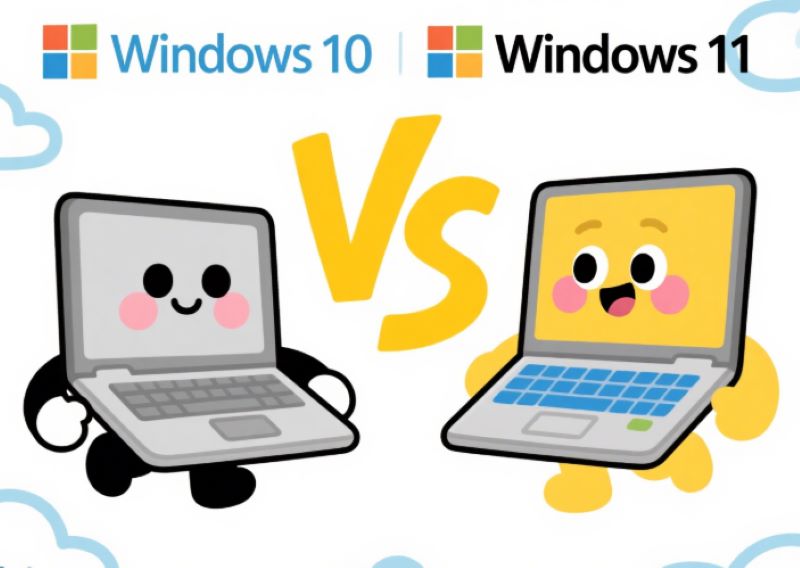With Microsoft announcing the end of support for Windows 10 on October 14, 2025, users are now faced with the choice of upgrading. Recently, Microsoft claimed in an official article that Windows 11 is 2.3 times faster than Windows 10. This announcement has attracted widespread attention, but it’s necessary to take a closer look at the truth behind this figure.
The Controversy: Microsoft’s Promotional Claims
In the article titled “Stay Secure Before Windows 10 Support Ends with Windows 11, Copilot+ PCs, and Windows 365,” Microsoft strongly promoted the advantages of Windows 11. It highlighted improvements in update mechanisms and performance, such as faster monthly updates and smaller feature update downloads, resulting in quicker wake-from-sleep responses, faster web browsing, and overall enhanced performance. It even explicitly claimed that Windows 11 PCs are 2.3 times faster than Windows 10 PCs.
On the surface, this seems to offer a compelling reason for users to upgrade. In today’s fast-paced tech world, users are always eager for better performance and faster systems to boost efficiency and user experience. Microsoft‘s statement makes it sound like upgrading to Windows 11 will magically transform your PC into a high-speed machine.
The Reality: Hardware Differences or System Optimization?
However, a deeper look into Microsoft’s testing process reveals some issues. The 2.3x performance claim is based on Geekbench 6 multi-core benchmark tests. In the December 2024 tests, Windows 10 machines used older processors, like Intel’s 6th, 8th, and 10th gen chips — including the i3-6100U, i5-6200U, and i7-8750H. On the other hand, the Windows 11 machines featured much newer 12th and 13th gen processors, such as the i5-1335U and Ultra 5125H.
Clearly, this is not a controlled test. The speed boost comes primarily from newer hardware rather than from operating system optimizations alone. It’s like comparing the speed of an old bicycle to a brand-new sports car, and concluding that the car is faster — while ignoring the massive hardware differences. So when Microsoft says “Windows 11 PCs are faster,” what they’re really highlighting is the performance of newer hardware, not a 2.3x leap in the OS itself.
Besides speed, Microsoft also claimed Windows 11 has 2.7 hours longer battery life, 3.2x faster web browsing, and double the productivity in Microsoft Office. But again, these figures were gathered using vastly different hardware setups, which undermines their validity and relevance without clear usage scenarios and real user feedback.

The User Dilemma: Upgrade or Stick with What You Have?
For many users, upgrading isn’t just about speed. It involves factors like software compatibility, user habits, and long-term support. Windows 11 does have technical advantages — it’s optimized for newer hardware and supports newer features. But for users relying on older devices, upgrading might not be the best choice.
In real-world use, is the performance improvement as dramatic as Microsoft claims? Some users have tested both systems on the same hardware and found the differences minimal. Boot time may be slightly shorter on Windows 11, but older, lower-spec PCs often run more smoothly on Windows 10. For daily tasks like office work and web browsing, performance is nearly identical. Some professional software even runs better on Windows 10. For gamers, Windows 11 may offer slightly better frame rates, especially in games optimized for new GPU technologies, but older games can occasionally stutter.
With support for Windows 10 ending, users will no longer receive security or technical updates, which poses some risk. But upgrading just for the sake of upgrading — especially if it means buying a new PC — may not be worth it for users on a tight budget or those with minimal performance needs.
Conclusion
While the speed difference between Windows 11 and Windows 10 may seem significant on paper, actual user experience tells a more nuanced story. As Windows 10’s end-of-life approaches, users should weigh their own needs and hardware conditions carefully. Should you stick with Windows 10 and wait for a better time to upgrade? Or jump into Windows 11 and embrace new features and technologies? It’s a decision every Windows user needs to think through carefully.












